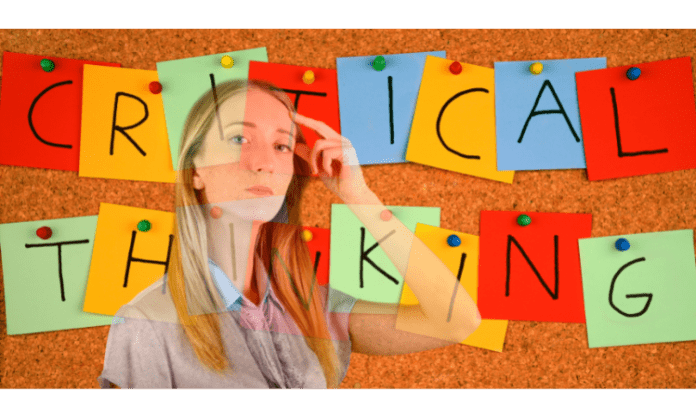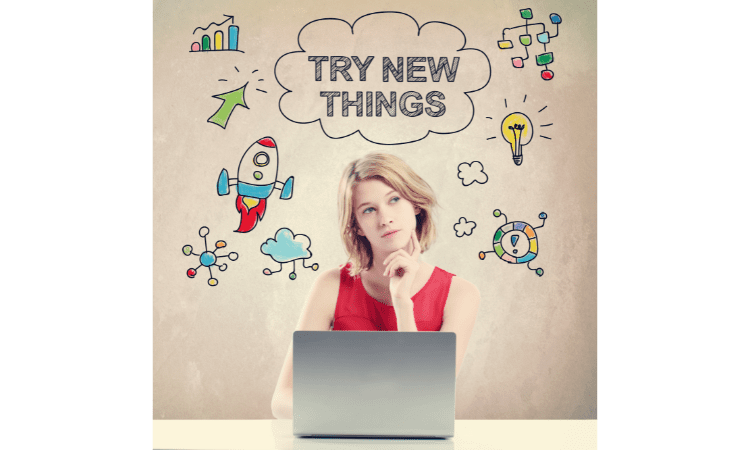
Critical thinking is one of the most sought-after skills in almost every industry and every workplace. In fact, according to research published by the World Economic Forum, critical thinking will become one of the top 10 job skills by 2025. With that said, it’s important to know how to develop your critical thinking skills to stay ahead of the curve and effectively solve problems. As you work on developing your critical thinking skills, keep these tips in mind:
Be self-aware.

To be more self-aware, you need to understand what you’re thinking and feeling. You should also be able to identify when you are making a mistake, why it happens and how to correct it.
The best way to become more self-aware is by practicing mindfulness meditation. This will help you understand your feelings better so that they don’t influence your decision-making process as much.
Understand your mental process.

When it comes to critical thinking, one of the most important things you can do is understand your own mental process.
To improve your critical thinking skills, you need to know how your brain works and what steps it takes to solve problems. For example, if a problem involves deductive reasoning, then you’ll want to start with the facts and build up from there. If a problem involves inductive reasoning or statistical analysis, then it’s best to examine all angles before coming up with an answer.
This might sound like common sense—and for many people who were taught how their brains work in school or at home as children, this is probably true—but for others who haven’t been taught these things (or don’t remember them), understanding their own mental processes can be difficult or impossible without some guidance and practice first. This can lead down many paths from simple self-awareness up through more complicated issues such as anxiety disorders or even depression itself!
Develop foresight.

Foresight is the ability to see into the future. It’s important for making decisions, planning and problem solving.
You can develop your foresight by imagining possible outcomes of various courses of action. For example, if you’re going on a road trip with friends, imagine what could go right or wrong on your trip by thinking about past experiences with other trips you’ve taken. This may help you make better decisions when deciding how long to stay out, where to stop along the way and when it’s time to turn around and head back home.
If you are struggling in school or at work and need help improving your critical thinking skills, check out our blog post on How To Improve Your Critical Thinking Skills
Practice active listening.

Listening is an important part of critical thinking. When we listen to other people, they know that we care about them and what they have to say. It also helps us learn new things. When you are listening to someone else, try to focus on what they are saying instead of thinking about what you’re going to say next or what you might do later.
When listening to someone talk, it’s easy for our minds wander off into different directions because of outside distractions or because we aren’t interested in the topic being discussed. Instead of doing this, try focusing on the words coming out of their mouth instead! This will help keep your mind engaged in the conversation while still keeping yourself open-minded enough so that new ideas can come forth after hearing something interesting (or not so interesting).
Ask questions.

You should ask questions to:
- Get more information. If something seems unclear or you’re not sure about something, ask for clarification.
- Clarify your understanding. If a concept hasn’t clicked for you, it’s worth asking the presenter to elaborate on it before moving on to another topic.
- Understand the other person’s point of view. When discussing a complex issue with others, there are often multiple perspectives that need to be considered before arriving at an informed decision. Asking questions will help you identify and examine these perspectives in order to come up with a more informed opinion than if you hadn’t asked any questions at all!
Evaluate existing evidence.

Evaluate existing evidence.
When you’re evaluating the quality of a piece of evidence, look at who produced it and why they produced it. Then consider whether or not their findings are accurate, valid and reliable (which we’ll explore in a bit). You can also evaluate the context in which they were collected: did they come from an experiment? Were they gathered from observations? Finally, think about how this particular piece of information fits into your overall body of knowledge about the topic at hand.
What does this mean for you? If someone has published research on a topic—whether it’s psychology or chemistry—you should be able to evaluate what kind of study was conducted and how trustworthy that study is based on its design and execution. And if something doesn’t make sense based on previous research on similar topics, then ask yourself why that might be the case before dismissing it outright as “junk science.”
Try reversing things.

Here’s an exercise to help you develop your ability to think critically: try reversing things.
When you read a news article, try reversing the situation. For example, if it was talking about how a company made billions by cutting costs in their manufacturing process, imagine what would happen if they cut costs in their marketing and sales divisions instead. What would be the result? How would that affect customers? Would they still buy the product? If so, why? If not, why not? These questions will help make you more aware of how different aspects of an organization interact with each other and influence outcomes—and thus better equipped to consider every option when making decisions at work or in life in general.
Think for yourself.

You need to think for yourself. The world is full of people who are willing to tell you what to do, what to believe, and how to think. But the truth is that if you’re going to become a critical thinker, doing as others say won’t get you very far.
Just as important as questioning authority is questioning yourself and your assumptions about the world around you. Being able to step back and look at your own beliefs critically will help you clarify them and discover flaws in their logic or evidence (if any). This can be quite difficult because it’s easy for our mindsets—even those that seem logical and well-supported—to become automatic habits over time without us realizing it or questioning them critically.
The goal isn’t just being creative; it’s also making sure they’re based on reality rather than fiction or personal opinions alone.”
If you are looking to improve your critical thinking skills, the above tips can help get you on the right path to success!
Critical thinking is the process of analyzing information and ideas in order to make logical decisions. It helps you determine what is true or untrue, pertinent or insignificant, significant or meaningless. Critical thinking skills are essential for success in life, but not everyone has them. If you are looking to improve your critical thinking skills, the above tips can help get you on the right path to success!
First, be aware of common biases that affect your decision-making process. Next, identify your own assumptions so that they do not cloud your judgment when making decisions later on down the line. Finally make sure that there aren’t any missing pieces of information needed before making an important choice—this will help ensure that it’s based on facts rather than just opinions alone.”
Conclusion
I hope this guide has given you some insight into how to improve your critical thinking skills. We live in a world where it is easier than ever before to get stuck in groupthink and go along with the crowd, but we also have access to more information than ever before as well. Becoming a better critical thinker can help you filter out what is important from what isn’t so that you can make better decisions in your life and work.











